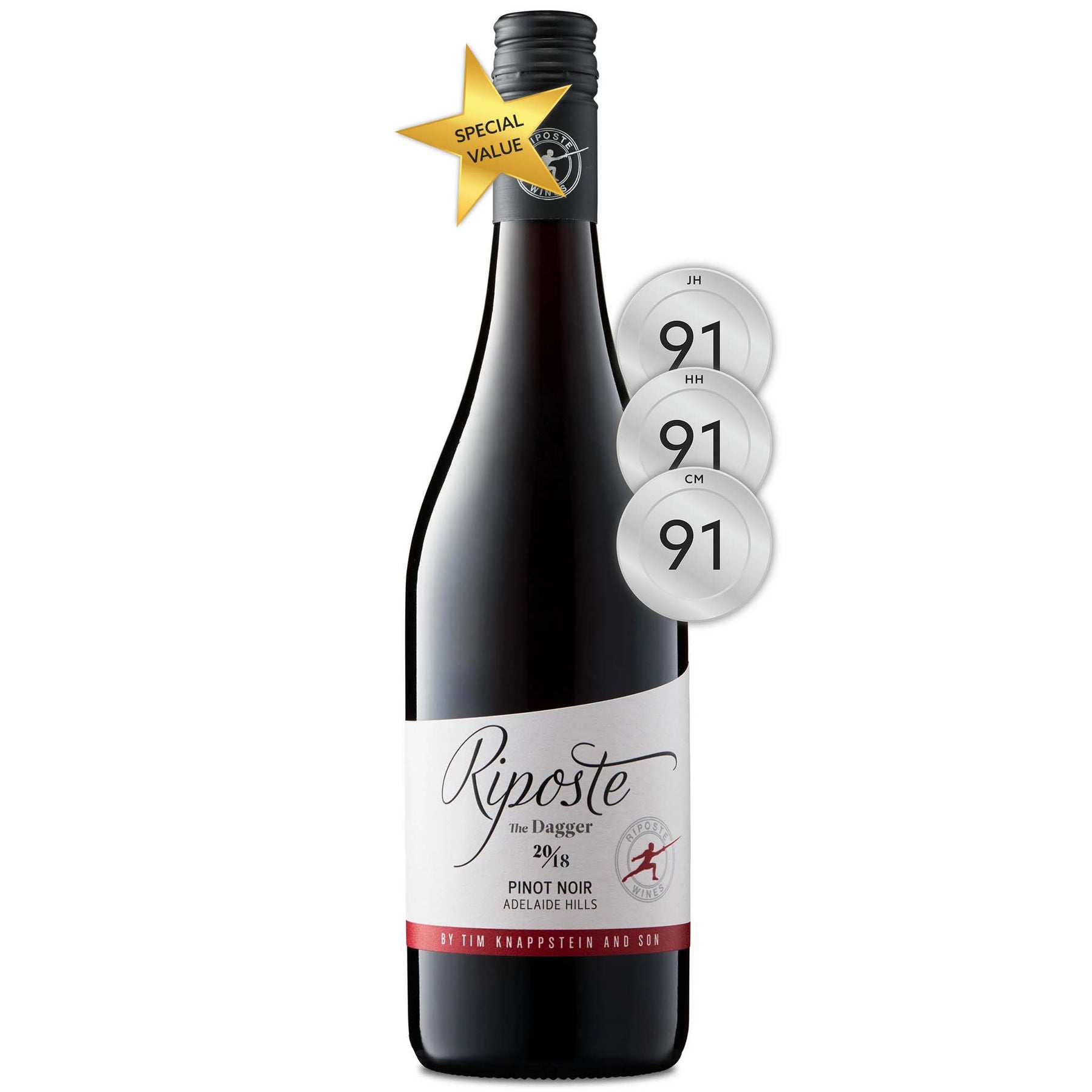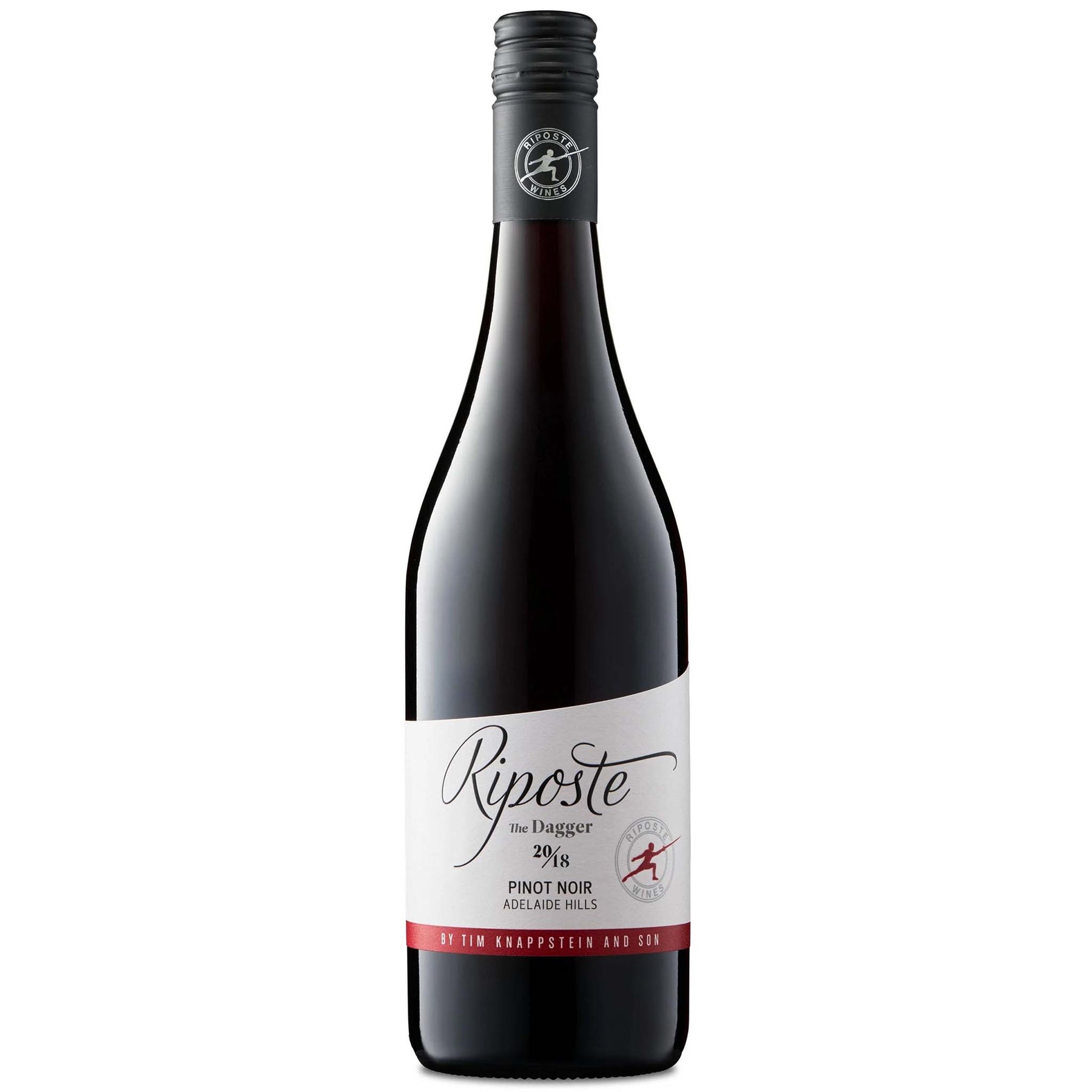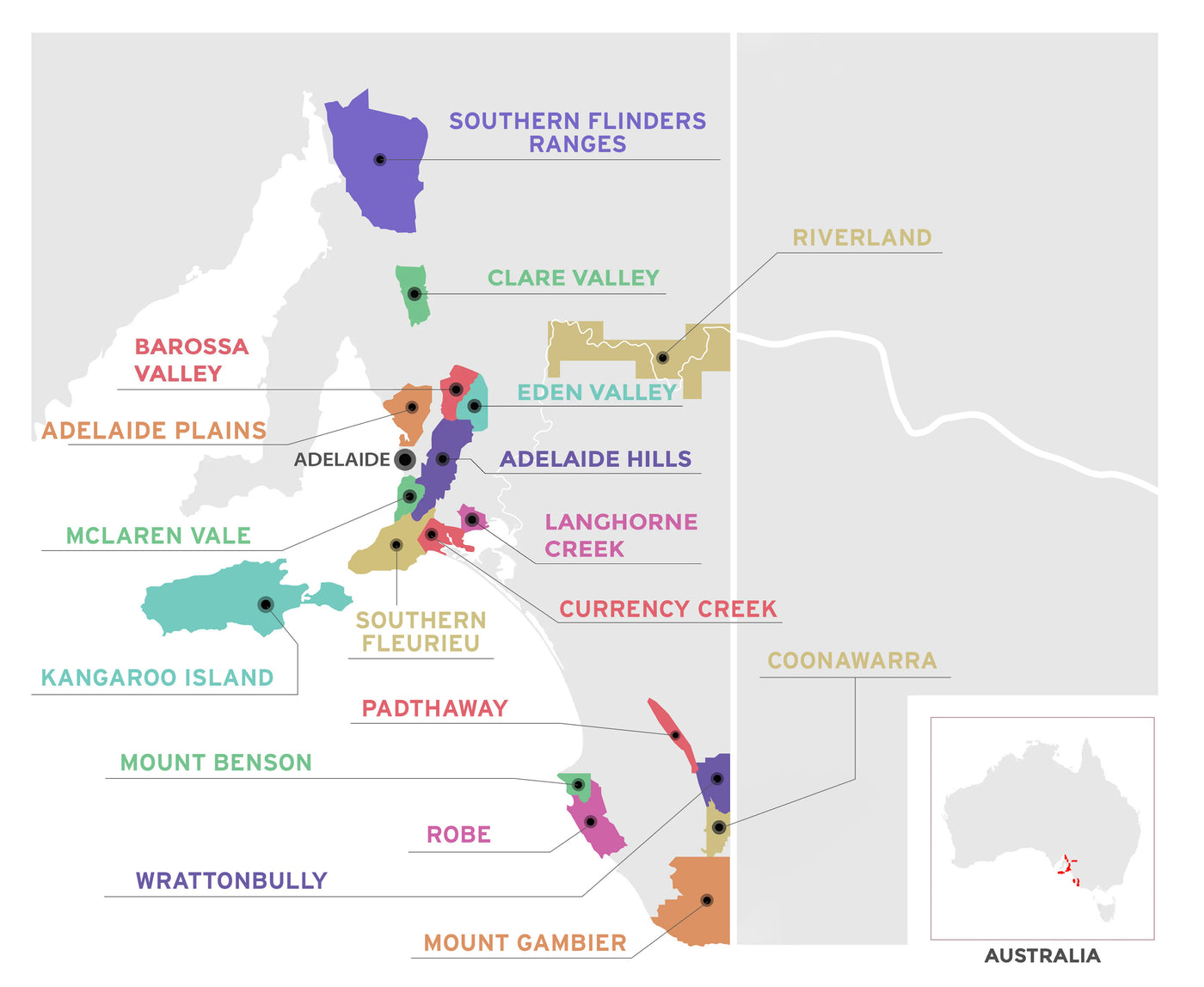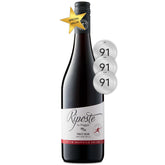

Riposte The Dagger Pinot Noir 2018
Style: Red Wine
Variety: Pinot Noir
Closure: Screwcap
Riposte The Dagger Pinot Noir 2018
Warehouse
34 Redland Drive
Vermont VIC 3133
Australia
Producer: Riposte
Country: Australia
Region: Adelaide Hills
Vintage: 2018
Critic Score: 91
Alcohol: 13.5%
Size: 750 ml
Drink by: 2030
"It is safe to say that Tim Knappstein is a legend in the Australian wine scene. He has worked in the business since 1966 and has totted up more than 500 wine-show awards, including 120 gold medals and 24 trophies." Matthew Jukes
Tim Knappstein has been making wine in South Australia for nigh on 60 years, an achievement in longevity few can match. He became a Clare Valley legend in the 1970s making wines for Stanley Leasingham and later pioneered winemaking in the Adelaide Hills where he established the region’s first cool-climate vineyard. Tim established his own label, Riposte by Tim Knappstein, in 2006. Today, Knappstein's main passion is for pinot noir and he makes two pinots under the Riposte label, the entry-level 'The Dagger' and 'The Sabre'.
"The palate is soft and fruit-sweet, charming and deliciously fruity. The tannins are light and soft, the wine very easygoing. A really lovely early-drinking wine, with good pinosity and early drinking properties as well as enough structure and intensity to take some age well. This is great value for money." Huon Hooke
Expert reviews
"A very well handled Adelaide Hills pinot, its price reflecting a marketplace that is at present stocked with lots of high quality wines selling below their true value. Unless political/trade blocks derail the situation, China's thirst may cause price rises of magnitude. So taste now, buy tomorrow. Drink by 2025." James Halliday, Halliday Wine Companion - 91 points and Special Value Wine ★
"Medium to full red/purple colour, with a sweet cherry and strawberry aroma, fruit-driven and straightforward. The palate is soft and fruit-sweet, charming and deliciously fruity. The tannins are light and soft, the wine very easygoing. A really lovely early-drinking wine, with good pinosity and early drinking properties as well as enough structure and intensity to take some age well. This is great value for money. Drink 2019-2028." Huon Hooke, The Real Review - 91 points
"This is fantastic buying. Such good drinking at a snip of a price. Cherry-plum, redcurrant, sweet oak, throws of spice. Its appeal is obvious and immediate. Tannin is gum-smooth; it continues the uncomplicated theme. Varietal character served easy as you like. Drink 2019-2023+." Campbell Mattinson, The Wine Front - 91 points
Awards
Special Value Wine – Halliday Wine Companion ★
Tim Knappstein
 The Knappstein family name has been involved in the wine business in South Australia since 1895 when Joseph Knappstein, Tim’s grandfather, founded 'The Stanley Wine Company' with three partners.
The Knappstein family name has been involved in the wine business in South Australia since 1895 when Joseph Knappstein, Tim’s grandfather, founded 'The Stanley Wine Company' with three partners.
Tim became a third generation vigneron when he commenced his career in the family company, making his first wine in 1966 after graduating from the Roseworthy College Oenology course. During the early years Tim amassed more than 500 show awards, including 120 gold medals and 24 trophies for the premium quality Stanley Leasingham range through a period when new technology was revolutionising both winemaking and the wines themselves.
Following the sale of 'The Stanley Wine Company' in 1971, Tim remained as winemaker until after the 1976 vintage He fashioned a brilliant array of rieslings under the famous Bin 5 and Bin 7 labels, of which he rates the 1971, 1973 and 1975 vintages as his proudest efforts. Although red wine was then but a small proportion of Stanley Leasingham’s production, the Bin 49 Cabernet Sauvignon, Bin 56 Cabernet Malbec and the Bin 61 Shiraz were often landmark wines. Knappstein ranks the 1971, 1972, 1973 and 1975 vintages of red wines as his favourites of the period and still believes the 1971 Bin 49 to be one of the best wines he’s ever made.
Tim developed his own vineyards at Clare and in 1976 started his own wine company, Tim Knappstein Enterprise Wines, in the old Enterprise brewery in Clare. He quickly hit his straps with a string of definitive Clare Valley rieslings and supple, reserved cabernet sauvignons in the late 1970s and early 1980s. He became renowned for his no compromise approach to winemaking, producing style and quality standouts in a very competitive industry and became a Clare Valley legend. Always an innovator and pioneer, in 1978 he introduced 'Fume Blanc' to the Australian market and in 1980 botrytised Riesling made under controlled atmosphere.
In 1986 he sold Enterprise Wines to Blass. By then, however, he was five years into a new project in Lenswood, high in the Adelaide Hills. In 1981 Tim was the first to plant a vineyard in the Lenswood area. That's because he had discovered cool climate. It happened on a trip to the Yarra Valley about 1978. "I was impressed by some of the wines, with their bright fruit flavours. I was soon sold on cool climate." Tim moved to Lenswood in 1985, where he still lives today. As the enormous potential of the Lenswood fruit emerged, Tim sold all his Clare interests in 1995 to concentrate solely on establishing their 26.3ha vineyard.
In 2004 Tim sold his Lenswood Vineyard, which was later on-sold to Henschke Wines. In the same year John Wicks, a friend in the Adelaide Hills, engaged Knappstein as Consultant Winemaker to help make his wines at Wicks Estate. Tim continued in that role until 2017.
In 2006 Tim established his own label, Riposte by Tim Knappstein (now Riposte by Tim Knappstein & Son). He works with a range of dedicated growers within the region to produce the Riposte range of wines, which he makes at the winery at Wicks Estate, eliminating the need to build an expensive winery of his own. Knappstein's main passion is for pinot noir. "We're living in the age of pinot noir," he says. "Today's wine drinker wants more medium-bodied, cool-climate red wines."
To the present day the accolades continue, with Tim having won multiple awards for his Pinot Noirs. Riposte has enabled Tim to fully utilise his rich and accumulated knowledge from a decorated 55+ years of winemaking, and his boundless enthusiasm to keep making exceptional well priced wine, from premium cool climate grapes of the Adelaide Hills.
The following article "Lenswood winemaker Tim Knappstein will be producing his 60th vintage this year" appeared in sommwine.com.au (SOMM is a South Australian fine wine distributor).

Lenswood winemaker Tim Knappstein has an achievement in longevity few can match. This is how he made it and what he fears is next.
Winemaker, race car driver, pilot and family man – Tim Knappstein wears many hats. But it is his passion for viticulture that has made him a household name around the globe and a well-regarded pioneer of the Adelaide Hills wine region as we know it today.
After all, it was 39 years ago that Knappstein acquired a parcel of land along Croft Road in Lenswood where he established the region’s first cool-climate vineyard.
In the midst of harvesting his 60th consecutive vintage – an almost unheard of achievement in the Australian wine industry – Knappstein’s love for winemaking has remained unchanged.
It’s also what has made the 75-year-old one of the wine industry’s great survivors.
"I think I will probably die on the job, making wine possibly," he says.
"The reality is that the perfect wine hasn’t been made yet…we are still trying to do it."
"Of course you have 'wow' moments every now and again and that moves your immediate appreciation of wines."
"But the perfect wine doesn’t exist and that’s because the game (of winemaking) always moves on … but that’s what makes it so fun."
Born into a wine production family, Knappstein grew up in the Clare Valley where his grandfather, Joseph Knappstein, founded the Stanley Wine Company with three partners in 1893. While the business was bought out by 1912, the company remained in the family’s control until 1971, when Len Evans helped broker its sale to the HJ Heinz Company.
A big mistake, according to Knappstein who says the 1970s was somewhat of a boom and bust era for the industry.
"It was a time when people could see that the wine industry was beginning to emerge and a number of companies sought to diversify," he said.
"The thing was, that none of them really saw, which really surprises me, the capital that was required in wine stocks. I think they thought it was more like beer, where you make it on Friday and sell it on Monday."
"But I remember the Heinz guys, when they took over Stanley, they were absolutely staggered by the money tied up in the stocks, because they bought in beans and tomato sauce, chucked it in cans, sold it and that was it."
"So after selling two years’ worth of wine stock and not having anything behind it, I think that really took them by surprise."
Despite everything, Knappstein remained as winemaker for Stanley until after the 1976 vintage, fashioning a brilliant array of rieslings under the famous Bin 5 and Bin 7 labels.
By then, he was in his fifties and ready for a new challenge.
Joking that perhaps he was approaching a midlife crisis, Knappstein, following a trip to the Yarra Valley, left the family business in pursuit of a new adventure.
With his mother as a partner, Tim Knappstein established Enterprise Wines in 1976, quickly hitting his straps with a string of definitive Clare Valley Rieslings and supple, reserved cabernet sauvignons in the late 1970s and early 1980s.
By the time the company was sold to Blass in 1986, which then sold to Mildara in 1991, the Knappstein’s were five years into their new project at Lenswood.
"Oddly enough it was a trip to the Yarra Valley in Victoria where I first became fascinated with really fresh and bright flavours from the early ripening varieties," he said.
"In cool areas, some varieties just work … including pinot and shiraz, which shows spicier tones in cool areas. Chardonnay you can also grow anywhere."
"So I was really quite taken by the cool climate viticulture that I saw in the Yarra Valley and then realised that we had the same sort of climate here in the Adelaide Hills."
"So that’s how we became the first to grow grapes in Lenswood and started with chardonnay and the following year we put in pinot (grapes)."
Alongside other Hills wine pioneers, including Brian Croser, Geoff Weaver and Stephen and Prue Henschke, Knappstein remains one of the key influencers within the local cool-climate grape industry.
While he no longer owns a vineyard, albeit having retained a small lot of the original Lenswood block, Knappstein now purchases grapes from other Hills growers to produce his Riposte range of wines, alongside his son Nick.
"I still call the shots on winemaking and Nick and I go over there and work during vintage," he says.
"So we work on our own vintage, fill barrels and sometimes when the shed is a bit tight, we go in at 2am and do a crush just for us when no one else is in the winery."
"So I’m still very much involved in winemaking and will as long as I can."
Today, the Knappstein brand is one of around 90-plus wine labels produced in the Adelaide Hills – 90 more there were almost four decades ago. It’s a frightening prospect according to the seasoned winemaker who believes the market is becoming crowded by those putting profit over product.
While a huge supporter of innovation, Knappstein says he was particularly baffled at times by the younger generation who appeared to be reinventing "the wheel".
"The art of winemaker is much more interesting now, it’s much more straightforward compared to when I started out when we had basic, horrible equipment," he said.
"That said, because it’s easier to make wine, the number of options you’ve got now when you walk into a bottle shop is quite frightening."
"The other thing is that we’ve gone back to mystify wine. I’m talking about the people who put on these labels with all this colourful language, like how the grapes were picked by the village virgins at 5am to describe the wines."
"I mean, as winemakers it’s not our job to mystify wine, but what they are doing is moving us back into wine wanker territory."
Knappstein says his advice to new-age winemakers is to focus on longevity, which includes considering environmental factors such as bushfires. "If this warm period continues on, then probably we need to find cooler places to plant varieties such as sauvignon blanc, pinot and varieties that are temperature sensitive," he said.
"So maybe this will be a tempranillo area in 100 years. But whatever happens, I am sure that the industry will adapt."
His statement follows a year of uncertainty for the industry with about 60 Hills growers still fighting the aftermath of the 2019 Cudlee Creek fires.
Knappstein and his wife Dale were among the first residents in the line of the fire, with their home located adjacent the Fox Creek Mount Bike Park.
Thankfully the couple was well equipped to save their home, and not only because of a 300,000-litre bore, two water tanks and a petrol-powered pump.
As participants in tarmac rallies and car racing events, they also own Normex fireproof driving suits, balaclavas and shoes which, Knappstein says may have just made them the most fire-smart locals on the ground.
"We always decided that we were going to stay and defend and the fact that we had fire-proof clothing was a big part of it," he said.
"So we pulled out our balaclavas and driving suits and off we went."
"That said, we were very that we had a very competent fire unit from Forestry SA come and park in the driveway, without them we would have lost our shed for sure."
While the Cudlee Creek blazes marked the most significant bushfire in Knappstein’s lifetime, he said natural disasters were a part of life in country SA.
"The worst disaster – and I have seen two that have pretty much affected the whole wine industry in SA – one was in 1974 when downy mildew arrived and people didn’t understand how to stop it at that point," he said.
"The other really horrible year was 2011 which again was a really wet year which saw down mildew, and powdery mildew, and that was interesting as a lot of the grape growers in the Adelaide Hills had never to deal with that before. It was a learning thing that caught them flat-footed."
"In a fire you’d be very unlucky to lose everything but with the wet seasons, we had growers that didn’t pick one grape."
Having witnessed plenty of ups and downs within the industry over the years, Knappstein says his tip for surviving year after year was finding a balance between work and play.
For him, he says, it’s always been his love for adrenalin sports, offering a change of pace between waiting for fruit to grow.
"A lot of winemakers are involved in wine 24/7 but I’ve always had interests elsewhere and cars have been a big thing for me," he says.
"The truth is, I like going fast and also used to fly and used to be a national champion glider pilot before I ever started flying things with engines."
"Maybe I got into it because I needed some hobbies to pass the time between waiting for my wine to be ready but it’s also offered me a great work-life balance."
"Because that’s the thing about winemaking; it’s not a job, it’s a lifestyle."
About the winery

Tim Knappstein has been making wine in South Australia for nigh on 60 years, an achievement in longevity few can match. He became a Clare Valley legend in the 1970s making wines for Stanley Leasingham and later pioneered winemaking in the Adelaide Hills where he established the region’s first cool-climate vineyard.
Tim established his own label, Riposte by Tim Knappstein, in 2006. He works with a range of dedicated growers within the region to produce the Riposte range of wines, which he makes at the winery at Wicks Estate, eliminating the need to build an expensive winery of his own. "I'm a virtual winery, following in the footsteps of Wolf Blass, who was the first virtual winery in Australia - I have no vineyards and no winery of my own."
Riposte is a family owned and run boutique winery. Tim, wife Dale and son Nick form a close-knit team that is guided by the winemaking philosophy to be 'hands-on' at every stage from vineyard to bottle. Each vineyard site is carefully selected for quality and its suitability for producing varietal character. Tim and son Nick work closely with the growers at every stage, ensuring grapes are picked at the optimum stage of ripeness, vibrancy and freshness.
In the winery, Tim and Nick carefully craft the wines in small batches maximising flavour and complexity creating wines of great distinction that preserve the character of the Adelaide Hills, South Australia’s premier cool climate region.
Riposte make two pinot noirs, a pinot gris, chardonnay, sauvignon blanc, shiraz and gewurztraminer, as well as a barrel-fermented white blend named The Halberd. All the wines are named after sword types, which, together with the name Riposte, is his reply to the challenges life has dealt him over his 50 years in the business. There's The Foil sauvignon blanc, The Stiletto pinot gris, The Scimitar riesling, The Dagger, The Katana chardonnay and The Sabre pinot noirs and The Cutlass shiraz.
Knappstein's main passion is pinot noir. "We're living in the age of pinot noir," he says. "Today's wine drinker wants more medium-bodied, cool-climate red wines." Pinot needs a cool climate, usually provided by high altitude, and Knappstein now sources as much fruit from high-altitude Summertown as from Lenswood. "The high-altitude sites over 500 metres produce deliciously fragrant light- to medium-bodied pinots, not the 'dry-red' style that you get from warmer sites." The Sabre is 50/50 Lenswood and Summertown, the Lenswood portion contributing richness and body, the Summertown portion aromatics and finesse.

South Australia
South Australian is responsible for more than half the production of all Australian wine. It is home to more than 900 wineries across 18 wine regions. The regions are Adelaide Hills, Adelaide Plains, Barossa Valley, Clare Valley, Coonawarra, Currency Creek, Eden Valley, Kangaroo Island, Langhorne Creek, McLaren Vale, Mount Benson, Mount Gambier, Padthaway, Riverland, Robe, Southern Fleurieu, Southern Flinders Ranges and Wrattonbully.
Many of the well-known names in the South Australian wine industry established their first vineyards in the late 1830s and early 1840s. The first vines in McLaren Vale were planted at Reynella in 1839 and Penfold's established Magill Estate on the outskirts of Adelaide in 1844.
South Australia has a vast diversity in geography and climate which allows the State to be able to produce a range of grape varieties - from cool climate Riesling in the Clare and Eden Vallies to the big, full bodied Shiraz wines of the Barossa Valley and McLaren Vale. Two of Australia's best-known wines, Penfolds Grange and Henschke Hill of Grace, are produced here. There is much to discover in South Australia for the wine lover.

